
The BBC Radiophonic Workshop was one of the sound effects units of the BBC, created in 1958 to produce incidental sounds and new music for radio and, later, television. The unit is known for its experimental and pioneering work in electronic music and music technology, as well as its popular scores for programmes such as Doctor Who and Quatermass and the Pit during the 1950s and 1960s.
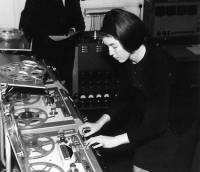
Delia Ann Derbyshire was an English musician and composer of electronic music. She carried out pioneering work with the BBC Radiophonic Workshop during the 1960s, including her electronic arrangement of the theme music to the British science-fiction television series Doctor Who. She has been referred to as "the unsung heroine of British electronic music", having influenced musicians including Aphex Twin, the Chemical Brothers and Paul Hartnoll of Orbital.
Paddy Kingsland is a composer of electronic music best known for his incidental music for science fiction series on BBC radio and television whilst working at the BBC Radiophonic Workshop. Educated at Eggar's Grammar School in Alton, Hampshire, he joined the BBC as a tape editor before moving on to become a studio manager for BBC Radio 1. In 1970 he joined the Radiophonic Workshop where he remained until 1981. His initial work was mostly signature tunes for BBC radio and TV programmes before going on to record incidental music for programmes including The Changes, two versions of The Hitchhiker's Guide to the Galaxy, as well as several serials of Doctor Who. His work on the latter series included incidental music for several serials in the early 1980s.
Bowers & Wilkins, commonly known as B&W, is a British company that produces consumer and professional loudspeakers and headphones.

BBC Radiophonic Music is the first compilation of music released by the BBC Radiophonic Workshop. It featured music by three of the Workshop's most prominent composers, John Baker, David Cain, and Delia Derbyshire. The album was originally released by BBC Radio Enterprises in 1968 to coincide with the Workshop's tenth anniversary and later re-released in 1971 on the BBC Records label.
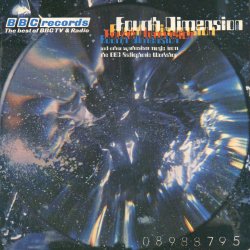
Fourth Dimension is a 1973 BBC Records release featuring recordings created by the BBC Radiophonic Workshop composer Paddy Kingsland. Although it was credited to "The BBC Radiophonic Workshop" it was the work of Kingsland alone, and was the first album of Workshop music to feature only one artist. It features theme tunes used by BBC radio and television. The music prominently features VCS 3 and "Delaware" Synthi 100 synthesisers, both from Electronic Music Studios (London) Ltd, with a standard rock-based session band providing backing. The track "Reg" featured as the B-side to the 1973 single release of the Doctor Who theme.

The Radiophonic Workshop is a 1975 compilation album by the BBC Radiophonic Workshop, similar in concept to the earlier BBC Radiophonic Music of 1968. The album featured a variety of work demonstrating many of the various techniques the Workshop used. Unlike its predecessor though, it was far more synthesiser orientated. The music comes from all types of sources from serious drama and documentary to the "Major Bloodnok's Stomach" sound effect from The Goon Show. As with the 1968 compilation, the album was remastered in 2002 by Mark Ayres and re-released with two bonus tracks from John Baker.

Through A Glass Darkly is a 1978 album by Peter Howell and the BBC Radiophonic Workshop. It featured six original instrumental compositions including "Through A Glass Darkly - A Lyrical Adventure", a 19-minute track which took up the whole of the first side of the record. Much of the music on the album leaned far more towards the prog rock of the 1970s than the previous output by the Radiophonic Workshop. The track "The Astronauts" later featured as the B-side to the 1980 single release of Howell's arrangement of the Doctor Who theme.
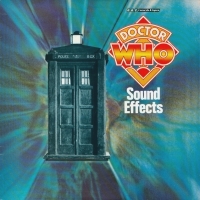
BBC Sound Effects No. 19: Doctor Who Sound Effects is a 1978 compilation of sound effects by the BBC Radiophonic Workshop from the BBC science fiction series Doctor Who. It was the first album in the BBC Sound Effects series to feature solely Radiophonic Workshop output and also the first commercial release of an album of the Doctor Who sound effects and atmospheres. The effects included came from throughout the show's history, covering both Brian Hodgson and Dick Mills' time recording effects for the programme. Effects that did not appear on the compilation included the TARDIS taking off and landing, sounds which are considered to be works of music by the BBC rather than mere effects. Each side of the record was re-released in the United States as a part of pair of picture disc compilations, which also included tracks from Doctor Who - The Music. It was remastered and re-released on 2 February 2012, by AudioGo. It was the first time the album had a CD release in the UK. AudioGo and Discovery Records then re-released the original vinyl LP on 21 April 2012 as part of Record Store Day.
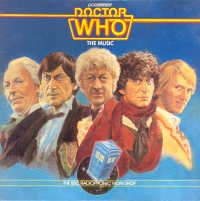
Doctor Who: The Music is a 1983 compilation of music from the BBC Radiophonic Workshop featuring incidental music from the popular science-fiction television series Doctor Who. The album was the first full-length to feature solely music from the programme. The collection was produced by Workshop member and long-time Doctor Who sound-effects creator Dick Mills. It featured the original Delia Derbyshire arrangement of Ron Grainer's theme tune and music by Malcolm Clarke from the 1972 serial "The Sea Devils", which was only the second to have an incidental score provided completely by the Radiophonic Workshop. Most of the music included came from serials from the previous three years to demonstrate the recent composers' works. For the album, each serial's incidental music was reassembled into short "suites" and although most of the music had been recorded in mono it was, for this compilation, remixed into stereo with sound effects added on to some tracks. The album was re-released in 1992 by Silva Screen records as Earthshock - Classic Music From The BBC Radiophonic Workshop Volume 1, with bonus tracks including "The Worlds of Doctor Who", a track recorded by Mills as a B-side to Dudley Simpson's 1973 "Moonbase 3" single, which featured a mix of music with sound effects from Planet of the Daleks before following with Simpson's "Master's Theme" and finishing with music from the serial The Mind of Evil. Selections from both this compilation and its follow-up, Doctor Who: The Music II, were also re-used on the 1994 Silva Screen compilation The Best of Doctor Who Volume 1: The Five Doctors.

Doctor Who: The Music II is a 1985 BBC Records album which is a sequel to Doctor Who: The Music released in 1983. Once again, it featured a selection of BBC Radiophonic Workshop music from the popular series. The compilation was made up of material recorded since its predecessor, including music from Workshop newcomer Jonathan Gibbs. As with the first album, the music was reassembled into short suites and remixed into stereo with added sound effects. It was re-released in 1992 on Silva Screen, with bonus tracks, as The Five Doctors - Classic Music From The BBC Radiophonic Workshop Volume 2. Selections from both Doctor Who - The Music albums were also re-used on the 1994 Silva Screen compilation The Best Of Doctor Who Volume 1 - The Five Doctors.

Doctor Who at the BBC Radiophonic Workshop Volume 1: The Early Years 1963–1969 is the first in a series of compilations of Doctor Who material recorded by the BBC Radiophonic Workshop. Compiled and remastered by Mark Ayres, the album features mostly sound effects and atmospheres from the first six years of the programme. Although some incidental music tracks do appear, most of the album's content is by original Doctor Who sound effects creator Brian Hodgson. The compilation also features three Radiophonic Workshop realisations of early Doctor Who composer Dudley Simpson's work.

Doctor Who at the BBC Radiophonic Workshop Volume 3: The Leisure Hive is the third in a series of compilations showcasing the BBC Radiophonic Workshop's work on the science-fiction programme Doctor Who. The album focused mainly on the Peter Howell synthesiser score for the 1980 serial The Leisure Hive, which received its first full release here. The compilation also collected some Dick Mills sound effects from the story as well as some effects from other 1980 serials Meglos and Full Circle, whose music would be the subject of the fourth volume in the series. The final track was a new remix of the original Delia Derbyshire version of the show's theme tune by series compiler Mark Ayres.
Harry Desmond Briscoe was an English composer, sound engineer and studio manager. He was the co-founder and original manager of the pioneering BBC Radiophonic Workshop.
Day One is an English band from Bristol, formed in 1998, and consisting of Phelim Byrne and Matthew Hardwidge. The band was originally signed to Virgin/Melancolik, the record label started by Massive Attack. Their début album, Ordinary Man, was released in 2000. Music from the LP was used in film soundtracks such as Cruel Intentions, The Big Tease and TV productions such as Six Feet Under, Trigger Happy TV and advertising campaigns including Adidas and Caterpillar.

Maida Vale Studios is a complex of seven BBC sound studios, of which five are in regular use, in Delaware Road, Maida Vale, west London.
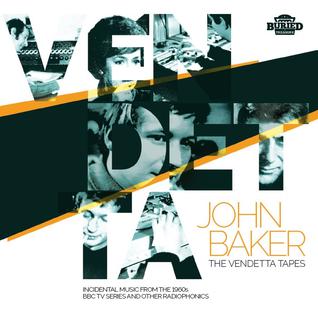
The Vendetta Tapes is a 2015 album of incidental music from the 1960s BBC television series Vendetta. It also includes other pieces from the BBC Radiophonic Workshop library that would not fit on The John Baker Tapes. It was mastered by Mark Ayres.
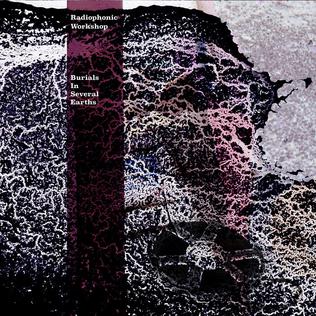
Burials in Several Earths is a 2017 album of recordings created by the Radiophonic Workshop, released on 19 May 2017. It marks the first official studio album since 1985's Doctor Who: The Music II.
This is the discography of the BBC Radiophonic Workshop, a British electronic music group. It consists of releases of music and sound effects.

Sound Effects No. 13 – Death & Horror is an album produced by Mike Harding of the BBC Radiophonic Workshop and released in 1977 by BBC Records & Tapes. It is the thirteenth instalment in the label's Sound Effects series and contains over 80 sound effects related to horror and death, so that producers may use them in amateur film and stage productions. Mike Harding and label staff man Ian Richardson picked numerous "classics" from the BBC Effects Library and from the BBC Radiophonic Workshop, but also created many new sound effects for the album themselves, many of which were created by "mistreating large white cabbages." The effects are arranged throughout the album into six distinct themed sections.















